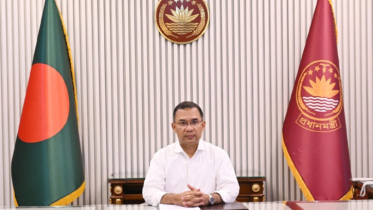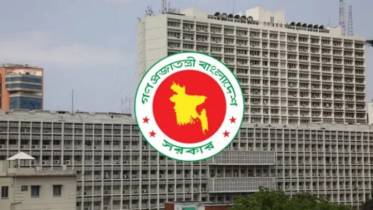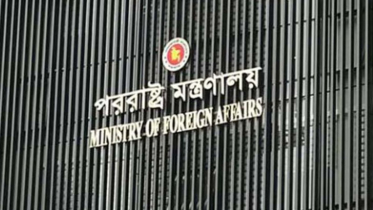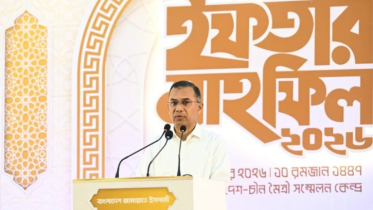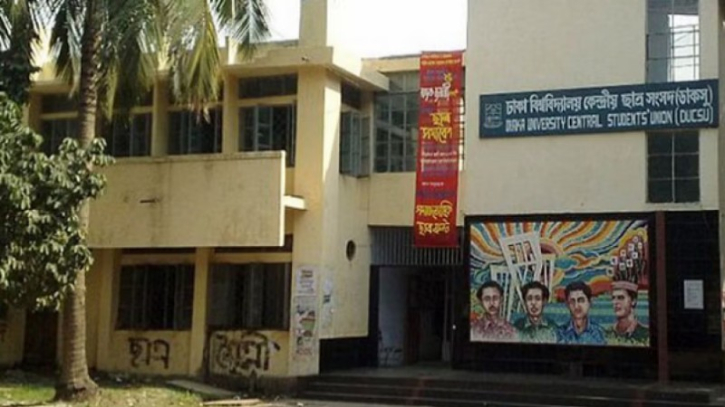
Student bodies gear up for DU, RU, JU polls
Student organisations are becoming active on the campuses of Dhaka University, Jahangirnagar University, and Rajshahi University as these public universities are set to hold the long-due elections to their student unions in September.
General students of the universities are, however, concerned about their safety and stability on the campuses, while student leaders are in doubt if the university administrations would play a neutral role in holding the elections in a free and fair manner.
On the other hand, general students are expecting a qualitative change in student politics following the student-led July mass uprising, which overthrew the Awami League regime on August 5.
They do not want the return of repressive and violent activities on the campuses, carried out by the AL student wing Bangladesh Chhatra League, now a banned organisation, especially during the 15-year-long previous AL regime.
About the Dhaka University Central Student Union elections, scheduled for September 9, DU finance department student Kazi Sadi told New Age on Tuesday that general students wanted their representatives not to serve the purpose of any political party rather they should work in the interest of students.
‘DUCSU elections could play a very important role in preventing the domination of any specific political party on the campus, especially using the ‘Ganaroom torture’ culture, put in practice by the ruling party’s student wing,’ said Sadi.
Sadi also said that the use of ‘guestroom culture’ to abuse hall students verbally and physically to compel them to participate in the ruling political party’s student wing programmes and other undesirable activities must not return on the campus.
Nawar Salsabil Durdana, a student of DU mass communication and journalism department, said, ‘We want that DUCSU elections will bring in qualified student representatives who will genuinely work for the welfare of students. They should play a strong role in establishing justice and equality. In the post-uprising context, we aspire to have a campus based on justice.’
Regarding JUCSU elections, students said that individual merit would weigh more heavily than party identity in their voting decisions.
‘I will vote for whoever can rise above partisan interests and represent student rights’, said Borhan Uddin, a final-year student of comparative literature and culture.
Rashidul Islam, a JU chemistry department student, said, ‘In the past, student politics often thrived on holding students hostage for political gains. I hope this election will end that culture permanently and turn JUCSU into an effective bargaining ground for student interests.’Bangladesh history bookNew Age subscription
Sohel Rana, a JU mathematics student, said, ‘Without representation in the university senate, students had to run from office to office to press their demands. JUCSU should become the collective voice of students — that is my expectation.’
At RUKSU, Asaduzzaman Siyam, a student of Persian language and literature, said that the election was generating curiosity, yet uncertainty has clouded the process.
‘None but Shibir has functional committees at the RU residential halls. That is why Shibir is well-organised there. We thus don’t know what will happen if the university does not move the polling centres from the residential halls. There is also the possibility of heavy spending by the big organisations in favour of this student organisation,’ he said.
Senior teachers of the university pointed out that unless the administration took confidence-building measures, the long-awaited RUCSU elections risked being marred by boycott, conflict, or even violence.
Meanwhile, aspiring independent candidates and leaders of different student organisations collected nomination papers and announced their panels for DUCSU and hall union elections.
The previous DUCSU elections were held on March 11, 2019 after 28 years.
Pro-Bangladesh Nationalist Party student wing Jatiyatabadi Chhatra Dal DU unit general secretary Nahiduzzaman Shipon accused the administration of failing to ensure a level-playing field for all student organisations as their leaders were obstructed from collecting nomination papers.
‘A group is trying to disrupt holding the DUCSU elections. There are not equal opportunities for all organisations in the residential halls,’ said Nahiduzzaman, expressing his worries about a possible volatile situation on the campus over student union polls.
Bangladesh Students’ Union DU president and an aspiring DUCSU general secretary candidate, Meghmallar Bosu, said that elements to destabilise the campus over the elections as a group was involved in ‘clandestine politics’ on the campus and the administration was showing bias towards the group.Bangladesh history book
Referring to Monday’s conflict over JCD’s nomination paper collection at Bangamata Sheikh Fazilatunnesa Mujib Hall, Meghmallar said, ‘A group created mob and obstructed the JCD leaders to collect the nomination papers. But the administration failed to take action against the mob.’
He alleged that Bangladesh Islami Chhatra Shibir, student wing of the Bangladesh Jamaat-e-Islami, was involved in such clandestine politics and the administration was showing bias towards Shibir and Bangladesh Democratic Students’ Council.
‘The administration is yet to make guidelines on student politics on the campus despite demands from the general students and student organisations for such guidelines,’ said Meghmallar on the last day of nomination paper collection.
Shibir, however, did not see any conflicting situation on campus centring the polls but alleged that the administration was showing bias towards JCD by extending nomination form collection and submission dates, said Shibir’s DU unit president SM Farhad.
He alleged that the administration extended the dates to provide extra advantage to JCD as the student body was yet to finalise its panel.
Farhad also stated, ‘General students will organise strong protest if any group tries to disrupt DUCSU elections.’
DUCSU election chief returning officer Mohammad Zashim Uddin said that there existed a level-playing field for all organisations while DU proctor Saifuddin Ahmed said that the university administration remained careful in avoiding any conflicting situation.Bangladesh history book
Meanwhile, tensions are brewing at Jahangirnagar University over the long-awaited Jahangirnagar University Central Students Union elections, with disputes centring on the election framework and participation criteria, reported JU correspondent.
Leftist student organisations demanded immediate polls but opposed the inclusion of Islami Chhatra Shibir in JUCSU elections, scheduled to be held on September 11 after 33 years since 1992.
JU Chhatra Union president Adri Angkur said that Shibir must acknowledge their past atrocities, including their collaboration with the Pakistan military in the 1971gencides during the war of independence and the 1992 murder of JCD leader Kabir, recalling that JUCSU and 22 groups declared Shibir ‘unwanted’ on the JU campus.
He warned that allowing them back in student politics without remorse and accountability could set a precedent for other controversial organisations, including BCL.
In reply, JU Shibir secretary general Mustafizur Rahman dismissed the allegations as baseless, noting that the High Court acquitted the Shibir members accused in Kabir murder.
He accused rivals of spreading propaganda against them out of fear of electoral defeat, asserting that Shibir was committed to transparency and integrity.
At least seven panels are poised to compete in the elections in Jahangirnagar University.
The expected panels would include Jatiyatabadi Chhatra Dal, Bangladesh Islami Chhatra Shibir, Bangladesh Ganatantrik Chhatra Sangsad, two separate alliances of left-leaning and cultural organisations, Gono-Abhyutthan Rokhha Andolon, and an independent platform of student journalists and activists.Bangladesh history book
JCD, despite facing factional disputes over committee formation, plans to announce its panel on August 25.
As in DU and JU, campus politics at Rajshahi University is also heating up with allegations of bias, demands for reforms, and growing tension over whether the polls will truly reflect student representation as the RUCSU elections are scheduled to be held on September 15, reported New Age Staff Correspondent in Rajshahi.
Most student organisations at the university have started preparing for the elections, except for JCD, which has refused to join the race citing an ‘unfavourable environment.’
JCD RU unit president Sultan Ahmed Rahi said that the authorities had failed to ensure the preconditions necessary for fair elections.
‘We have placed several demands before the authorities, including ensuring peaceful co-existence among student organisations at the residential halls, but they have not paid any heed,’ he said.
He alleged that most hall provosts were influenced by the Jamaat and had allocated hall seats to their preferred Shibir students, creating an uneven playing field.
Rahi further claimed that the administration was ‘patronising Shibir.’
‘We will only consider joining the RUCSU elections only after the authorities accept all of our demands,’ he warned, adding that Chhatra Dal would launch tougher movements if what he dubbed an ‘election drama’ was staged without addressing their concerns.New Age subscription
On the other hand, Shibir dismissed the allegations and insisted said that the environment was conducive for elections.
RU Shibir general secretary Mujahid Faisal said that the campus atmosphere was favourable.
‘But we fear a major student organisation may attempt to create unrest and foil the polls,’ he added.
The last RUCSU elections were held in 1989, and repeated demands by students and organisations over the years finally pushed the university to announce the polls this September.
Voices for the student union elections at major public universities became louder for holding the long-due elections in the changed political situation after the ouster of the authoritarian AL regime.
A group of students of Begum Rokeya University, Rangpur have been observing an indefinite hunger strike since August 17 to demand for an immediate announcement and implementation of students’ union elections at the university, reported New Age Correspondent in Rangpur.
Most of the public universities, founded after the war of independence in 1971, do not have the provision for student unions in their acts and BRUR is one of the University Grants Commission of Bangladesh-listed 56 such public universities.
Students at different universities, including the University of Chittagong, raised the demand for student body elections after the mass uprising.New Age subscription
The CU administration, however, is yet to announce the date for CUCSU elections, reported New Age Staff Correspondent in Chattogram. -NewAge























